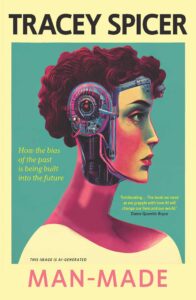In her book new book, Man-Made, Walkley Award-winning journalist Tracey Spicer asks the hard quesitons about how AI will change our lives. What’s the point in agitating to change the present, if bigotry is being embedded into our futures? BroadAgenda editor, Ginger Gorman, sat down with Tracey and had a chat.
AI has been in the news a lot lately. What is AI (in a very basic way)? And why do you think people are so scared about it?
AI is a constellation of technologies that mimics the human brain. Every time we use a chatbot, search engine or robot vacuum cleaner, we’re interacting with artificial intelligence. Many people are scared of AI because of its capacity to appear sentient: like a human. For example, communicating with ChatGPT can seem like chatting with a friend. It’s quite disconcerting.
Why did you want to write about AI?
When my son was 11 years old, he asked for a “robot slave”. Taj had been watching the TV cartoon series South Park, in which Cartman orders around his Amazon Alexa in vulgar and offensive language. This was a lightbulb moment: I realised the 1950s ideal of women and girls being servile is being embedded into the machines of the future. Suddenly, I feared that the gains of the civil rights and feminist movements would be rolled back because of algorithmic bias.

Cover: Man-Made
How the bias of the past is being built into the future
You believe folks are asking the wrong questions. What SHOULD we be concerned about?
There’s been a lot of coverage about data privacy, copyright and how artificial intelligence challenges what is means to be human. These are important issues. But most of the people speaking about this are male technologists. Bias and discrimination are seen as lesser-order problems. However, this bigotry can be a matter of life-and-death. Algorithms are deciding whether you can emigrate, get a promotion, or access medical treatment in hospital. These real-world conundrums are happening right now, all around the world.
What does misogyny and bigotry have to do with AI?
EVERYTHING. The majority of AI innovations are being created by a small group of white men in Silicon Valley. They’re creating a perfect world in which technology works really well – for them. One of the most obvious examples is pointed out by Chukwuemeka Afigbo, a Nigerian tech worker.
Afigbo tweets a video of a ‘racist’ automatic soap dispenser at a Marriott hotel: it works for a white person’s hands, but not a Black person’s. Issues like this would be easily avoided by testing devices on people with a variety of skin tones. But creators are beset by their own unconscious bias.
What kind of world will unfold if we don’t intervene now?
There’s a clear and present danger we’re heading towards a dystopian future marked by authoritarian governments, mass unemployment and poverty, and digitally-entrenched injustice.
What’s the alternative to this?
We need more women and people from marginalised communities in positions of power within the technology sector, to embed diversity and inclusion from the outset.
Ethics must be considered as a priority. And we should harness the power of radical compassion to embrace humanity, instead of outsourcing it to the corporate sector. Ultimately, I am optimistic that we will pull ourselves back from the brink.
‘I tend to think we have an obligation to tell stories about a future that is more just and fair and equitable and sustainable, and thus also more optimistic,’ Distinguished Professor Genevieve Bell from the ANU tells me. ‘And I think we also have an obligation to actively disrupt the present to make those stories possible.’
Your book is very funny! What’s your favourite hilarious anecdote in the book?
During online shopping expeditions, are you asked to approve replacements if items are out of stock? Add artificial intelligence, and you end up with some hilarious suggestions. One Facebook user posts a screenshot of a product substitution attempted by Walmart in the US.
Tampax Pearl tampons are unavailable, so the robot suggests whole white mushrooms instead. I’ve never tried to shove a mushie up there to absorb the bleeding, but who knows? It could become a natural alternative.
What did you learn that you weren’t expecting?
That there is a childcare robot in Japan which says, “I’m watching over you, even when you are sleeping”. Creepy.
What do you hope people take away from your book? Is there anything else you want to say?
I hope Man-Made opens people’s eyes to the tectonic shifts happening in recent years. We’re living through the Fourth Industrial Revolution. This is a priceless opportunity for all of us to play a part in a future made for humans, by humans. It’s time to stand tall and say, “Enough!”
Picture at top: Walkley Award-winning journalist Tracey Spicer. Picture: Supplied
Ginger Gorman is a fearless and multi award-winning social justice journalist and feminist. Ginger’s bestselling book, Troll Hunting,came out in 2019. Since then, she’s been in demand both nationally and globally as an expert on cyberhate and the real-life harm predator trolling can do. She's also the editor of BroadAgenda and gender editor at HerCanberra. Ginger hosts the popular "Seriously Social" podcast for the Academy of the Social Sciences in Australia. Follow her on Twitter.





